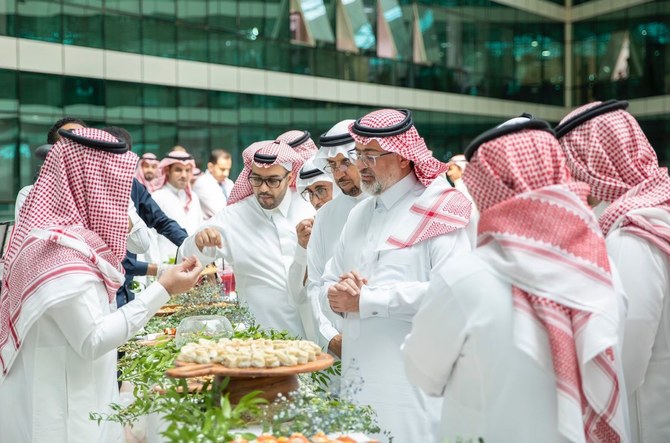At Makkah Halal Forum, Abdullah Kamel calls for integration of public and private sectors
MAKKAH — Minister of Commerce Dr. Majed Al-Qasabi inaugurated on Wednesday the Makkah Halal Forum at the Makkah Chamber of Exhibitions and Events Center. The inaugural session was held in the presence of Sheikh Abdullah Saleh Kamel, chairman of the Board of Directors of the Makkah Chamber of Commerce and Industry, as well as officials from many countries and specialists in the field of halal industries from various countries around the world.

In his speech, Al-Qasabi emphasized that halal industries are of special importance, and made them among the things that the Kingdom cares about. “Saudi Arabia has spared no efforts in supporting the halal industries, as well as in enabling and localizing the halal products industry locally, strengthening and developing this system on a global scale, and providing quality investments within this vital industry.”
Al-Qasabi said that the Saudi Vision 2030 contains many strategic goals and performance measurement indicators, in addition to a set of commitments based on pillars and axes. The public, private and non-profit sectors are participating in achieving these goals and that is under the governance of the Council of Economic and Development Affairs (CEDA).
He stressed that this international forum, that is being held in line with the directives of the higher authorities, represents one of the relevant mechanisms that the business sector is interested in, especially through the chambers of commerce, the private sector, the Halal Products Development Company owned by the Public Investment Fund, the National Industrial Development and Logistics Services Program, the Saudi Standards, Metrology and Quality Organization, and the Saudi Food and Drug Authority.
“Translating the Saudi Vision into multiple achievable plans with a reliance on innovative work mechanisms that suit the requirements and common national goals, and supporting the system of integration between the public and private sectors, will facilitate the transformation of the goals into a reality that influences the momentum of national development and economic diversification, which is what the sector gains.”
Al-Qasabi also stressed that Saudi Arabia looks at the complementary role of the private sector in identifying challenges, and developing proposals and solutions to enhance the position of Saudi Arabia as a global center for halal products and services in support of the national economy and its diversification on the basis of the Vision 2030.

In his speech, Sheikh Abdullah Saleh Kamel thanked Custodian of the Two Holy Mosques King Salman and Crown Prince and Prime Minister Mohammed bin Salman, the pioneer of the vision and architect of change, for their great support for the commercial and economic sectors without any exception. He also thanked Minister of Commerce Dr. Majed Al-Qasabi, the patron of the Makkah Halal Forum, for the confidence reposed in the Makkah Chamber, and his continued support for all its projects, in addition to the promotion of everything that expands the horizons of integration between the government and private sectors, and creating promising development opportunities for the Makkah community and its business environment.
“I thank our partners, the Saudi Food and Drug Authority and the Saudi Standards, Metrology and Quality Organization for their support of the Makkah Halal Forum, the Halal Products Development Company affiliated with the Public Investment Fund, and the National Industrial Development and Logistics Services Program. I also thank all our honorable sponsors for their efforts and generous care,” he said.
Sheikh Kamel praised the Makkah Halal Forum, which is the first of its kind to knock on the door of hearts, and does not knock on it seeking permission or entering for the first time, but rather returning and settling at its source and stable, and he extended his thanks to the members of the Partnership of Manafea Agreement.
“In order to activate our vital role in supporting integration between the private and public sectors, opening avenues for international partnership, and enhancing economic and trade participation by promoting the concept of halal industries, we and our partners presented the Makkah Halal Forum. The event aims to contribute to promoting everything that promotes halal industries, and encourage creativity and innovation in them by bringing together decision-makers and business owners under one roof, and opening the way to review the latest technologies and concepts for improving halal industries,” he said, adding, “we are consistent in our strategic directions with those of Saudi Arabia related to halal industries and participating in supporting national economic growth and participating in its diversification.”
Sheikh Kamel thanked the sponsors of the Makkah Halal Forum, as well as partners, guests, and speakers from various countries of the world, for their active participation in enhancing awareness of halal industries, identifying their challenges, and advancing the sector as a whole.
The sessions of the forum continued on its second day on Wednesday with the participation of 11 speakers. The forum reviewed in the first session titled “Creativity in targeting new segments of customers,” which specialized in complementary services such as financing, insurance, and logistics services. The session reviewed targeting new segments of customers, with reviewing the importance of expanding the customer base and targeting new segments in achieving growth and commercial excellence in the industry of complementary services, finance and insurance logistics, and demographic and behavioral shifts in customers.
It also reviewed analyzing the demographic and behavioral shifts in the market and how to target the new segments that arise from those shifts and innovative marketing strategies to target and discuss innovative marketing strategies and effective channels to reach new segments of customers in the complementary services industry, finance and insurance logistics, and technology and innovation in targeting new segments, examining how to use technology and innovation to identify and reach new segments of customers and meet their changing needs




